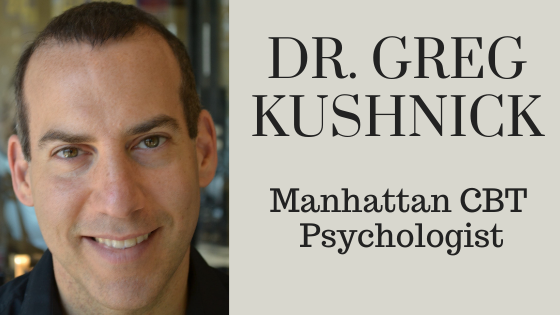
CBT for Social Anxiety in New York City
We all have a need to connect with others. This basic human need can be a source of mental discomfort if we have obstacles preventing us from placing ourselves in opportunities to gain social fulfillment.
Social anxiety is a common experience, but for many New Yorkers, especially people who lean toward a high achievement/high control-type of personality, social anxiousness can reach incredibly uncomfortable levels that promote avoidance of potentially satisfying experiences and relationships. Social anxiety disorder (SAD), also referred to as social phobia, is a label that is given when the anxiety has a debilitating impact on your life. I’m not a huge fan of labels, but sometimes they are helpful for making distinctions and identifying the best course of treatment. Social phobia is sometimes used to refer to unrealistic fears regarding a specific social scenario.
The tricky part of social anxiety is that avoidance often becomes the default way of coping. Of course, mild avoidance of social situations can be helpful, as it allows for time to sit with one’s thoughts and recover from a stressful week or a particularly exhausting experience. However, more persistent avoidance of social situations leads to a vicious cycle of greater avoidance and self-loathing/self-criticism.
When you actively avoid social situations (or use significant amounts of alcohol to cope with social situations), you experience relief from the feared scenario of having to endure extreme discomfort, a panic attack, potential rejection or failure. However, for many people there is also an equally uncomfortable or even worse feeling of discomfort that comes with the failure to socialize.
People often judge themselves harshly and feel remorse about missing an opportunity. Taking away opportunities for social connection only reinforces negative beliefs about the self. In addition, I have found that chronic social avoidance caused by social anxiety also leads to varying amounts of depression, ranging from a mild case of the blues to more severe and debilitating depressive experiences that affect daily life in profound ways.
CBT Therapy for Social Anxiety
The good news is that therapy for social anxiety can be very effective. I find that clients seem to benefit more when I incorporate cognitive behavioral therapy (or CBT therapy for short) tools into my approach. Exposure therapy for social anxiety disorder is added to the treatment as needed.
Put another way, successful treatment of social anxiety via CBT therapy requires a few components:
- A cognitive approach that emphasizes altering thinking errors and unrealistic self-standards, and reduces self-criticism and rumination.
- A behavioral/coaching approach that focuses on reducing unhelpful emotional responses and increasing exposure to social situations, while using feedback gleaned from new social experiences to inform efforts to alter problematic beliefs and standards.
Managing Social Anxiety in NYC
New York City culture amplifies the importance of social success and performance. The most socially successful people are celebrated in real life and on social media, which creates pressure, shame, FOMO, fears of losing one’s job, and a lot of other uncomfortable thoughts for many people.
Frankly, it’s just a whole lot of pressure to be social in NYC.
Since the pandemic ended, I have seen a significant increase in the number of clients requesting CBT therapy for social anxiety/phobia. It seems as though the stakes are even higher in a post-pandemic NYC where many people are working remotely at least part of the workweek, which limits opportunities for true social connection and places people in their own heads for a greater portion of the day, as opposed to directing energy toward others.
This closed system of chewing on your own thoughts in place of in-person social exposure appears to make thoughts of self-doubt, rejection and avoidance run wild.
Effective Social Anxiety Treatment in NYC
I’m here to help you with your social anxiety. If you’re searching for a psychologist for yourself or for a loved one, an experienced CBT therapist can make a huge difference in helping to reduce social anxiety and avoidance.
Feel free to reach out with any questions regarding therapy for social anxiety. I love what I do and I am happy to work with you or your loved one.
All the best,
Greg Kushnick
Related Posts
18 Ways to Avoid Sabotaging Your Happiness: A New Guide
Welcome to the ultimate happiness guide! I’m going to teach you how to...
11 Things You Need to Know About Starting Therapy in NYC
The decision to start therapy in New York City can be scary as hell....


